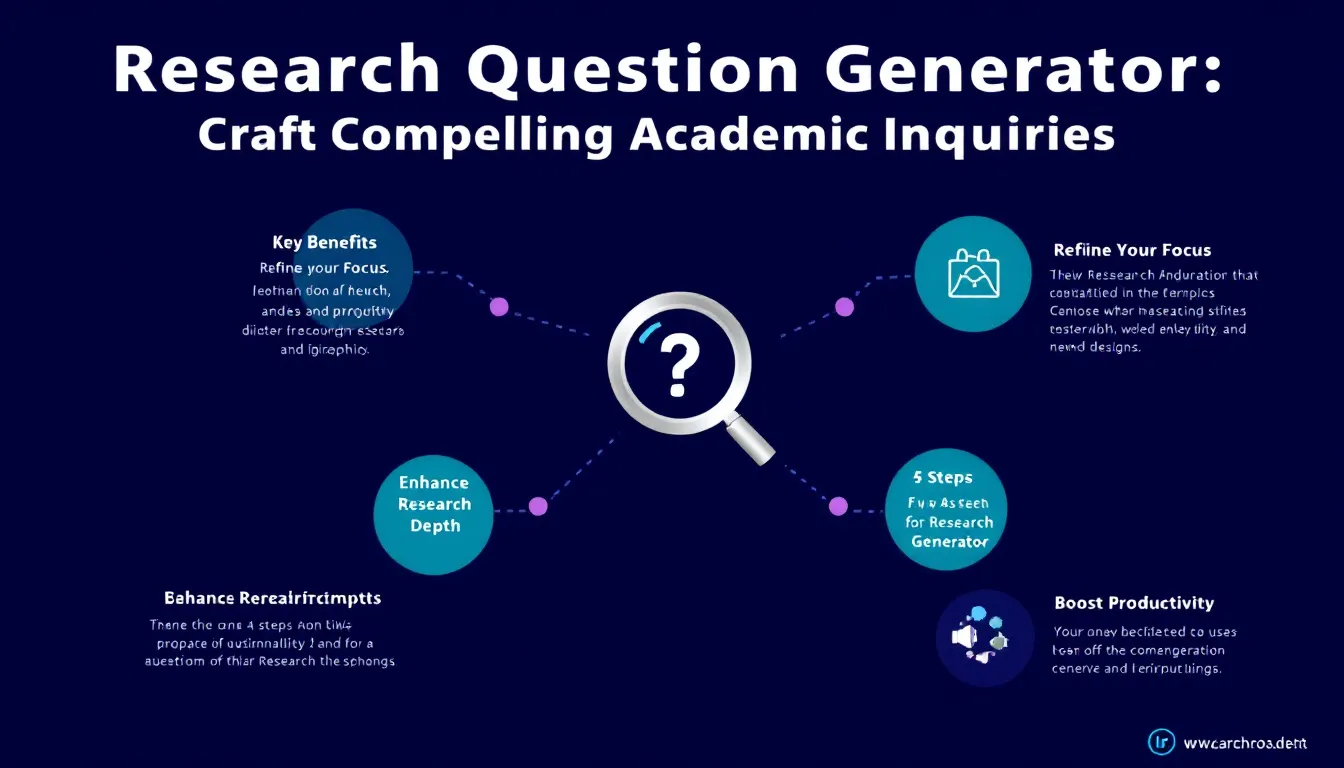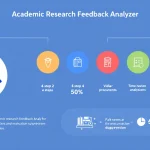Research Question Generator
Is this tool helpful?
How to Use the Research Question Generator Tool Effectively
The Research Question Generator Tool helps you craft focused and meaningful academic inquiries tailored to your research interests. Follow these steps to get the most out of it:
1. Enter Your Research Topic
Type the specific subject you want to explore. Choose a clear, concise topic that outlines the core of your research. Here are examples:
- Renewable energy adoption in rural communities
- Machine learning applications in medical diagnostics
2. Specify the Field of Study
Indicate the academic discipline related to your research. This helps contextualize your question. Sample inputs include:
- Behavioral Economics
- Biomedical Engineering
3. Describe Current Trends (Optional)
Provide recent developments, emerging debates, or technological advancements in your field. Adding this helps the tool generate relevant and up-to-date research questions. For instance:
- Advancements in deep learning for image recognition
- Policy changes influencing microfinance adoption after economic crises
4. Generate Your Research Question
Click the “Generate Research Question” button. The tool processes your inputs and produces a tailored research question that sharpens your focus and guides your investigation.
5. Review and Refine
Examine the generated question carefully. If it needs adjustment, update your inputs and generate again until you find a question that fits your research goals.
6. Copy and Use
Once happy with the question, copy it to use in proposals, papers, or grant applications.
—What Is the Research Question Generator Tool and Why Use It?
The Research Question Generator Tool is a smart academic aid that transforms broad research topics into clear, specific, and researchable questions. Designed for students, researchers, and academics, it uses natural language processing to shape your ideas into focused queries that guide meaningful studies.
Purpose of the Tool
A strong research question defines your study’s direction and scope. This tool helps you:
- Save time by quickly generating well-structured questions
- Clarify your research objectives with precise language
- Align your focus with current academic trends and societal issues
- Identify key variables and suggest potential research methods implicitly
- Encourage interdisciplinary approaches by combining multiple fields
- Inspire further refinement and deeper investigation
Benefits You Gain
- Sharper Focus: Helps transform broad ideas into manageable and targeted questions.
- Efficiency: Cuts down brainstorming time, letting you concentrate on research design and execution.
- Academic Standards: Produces questions that follow principles of clarity, specificity, and feasibility.
- Innovative Perspectives: Fosters interdisciplinary thinking by integrating multiple research areas.
- Critical Thinking: Prompts you to consider the question’s impact and refine it thoughtfully.
- Consistency: Useful for research groups aiming for standardized question formulation.
Practical Usage of the Research Question Generator Tool
This tool fits seamlessly into your research workflow wherever formulating or refining a research question is needed. Here’s how you might apply it across fields:
Environmental Policy Analysis
- Research Topic: Urban air pollution mitigation strategies
- Field of Study: Environmental Policy and Public Administration
- Current Trends: Increasing use of sensor networks for real-time pollution monitoring
Resulting Research Question: How effective are sensor network-based air pollution monitoring systems in informing urban environmental policy and improving public health outcomes?
Artificial Intelligence Ethics
- Research Topic: Ethical implications of autonomous vehicle decision-making
- Field of Study: Computer Science and Philosophy
- Current Trends: Adoption of AI explainability frameworks and regulations
Resulting Research Question: What ethical frameworks best guide decision-making algorithms in autonomous vehicles to balance safety, transparency, and societal acceptance?
Health Informatics
- Research Topic: Integration of electronic health records with patient wearable devices
- Field of Study: Health Informatics and Data Science
- Current Trends: Increasing patient-generated health data and privacy concerns
Resulting Research Question: How does the integration of wearable device data into electronic health records impact patient outcomes and data privacy management in clinical practice?
—FAQs About the Research Question Generator Tool
Q1: Can this tool replace the need for a literature review?
No. The tool helps you draft initial research questions, but conducting a thorough literature review is essential for understanding relevant studies and refining your question.
Q2: How specific should my research topic be?
Provide a focused but clear topic that can be summarized within one or two sentences. This balance allows the tool to generate an actionable question without being too restrictive.
Q3: Is the tool suitable for interdisciplinary research?
Yes. You can combine fields (e.g., “Neuroscience and Robotics”) to generate questions that connect multiple disciplines.
Q4: When should I use this tool in my research?
Use it primarily to develop initial research questions early on. It’s also helpful during later stages when refining or exploring alternative approaches.
Q5: Can I use the generated questions directly in proposals?
The generated questions provide strong foundations, but reviewing and tailoring them to your research scope and objectives will strengthen your proposals.
Q6: How does adding current trends improve results?
Including trends ensures your research question reflects up-to-date academic conversations and societal challenges, making your research more timely and impactful.
Important Disclaimer
The calculations, results, and content provided by our tools are not guaranteed to be accurate, complete, or reliable. Users are responsible for verifying and interpreting the results. Our content and tools may contain errors, biases, or inconsistencies. Do not enter personal data, sensitive information, or personally identifiable information in our web forms or tools. Such data entry violates our terms of service and may result in unauthorized disclosure to third parties. We reserve the right to save inputs and outputs from our tools for the purposes of error debugging, bias identification, and performance improvement. External companies providing AI models used in our tools may also save and process data in accordance with their own policies. By using our tools, you consent to this data collection and processing. We reserve the right to limit the usage of our tools based on current usability factors.







